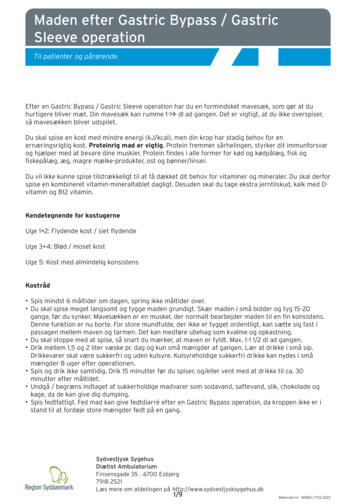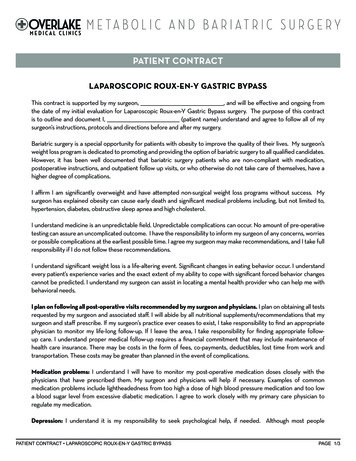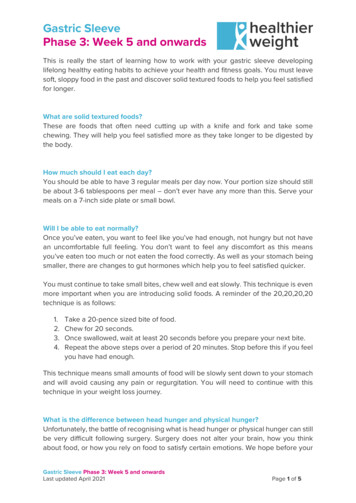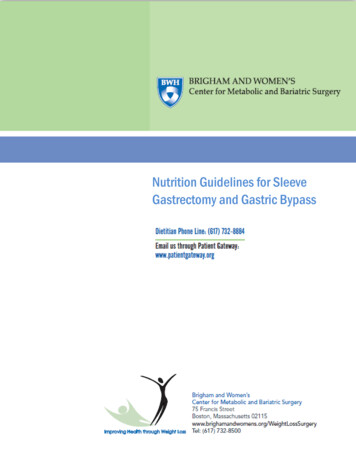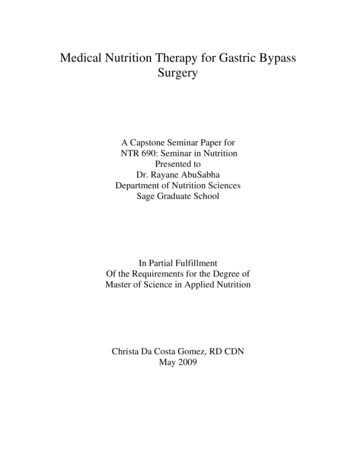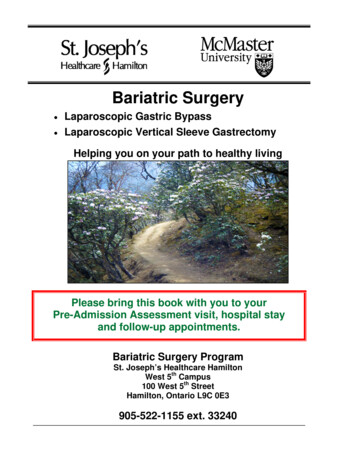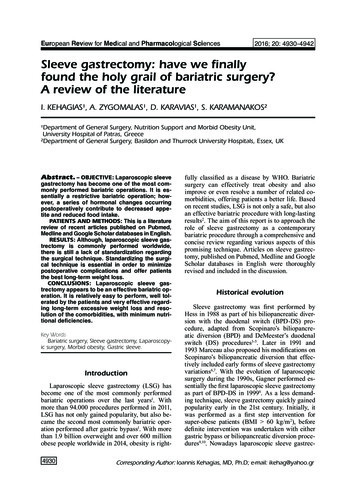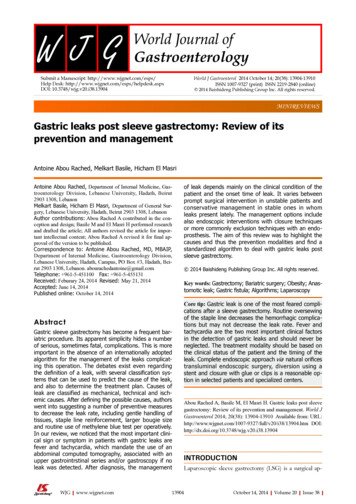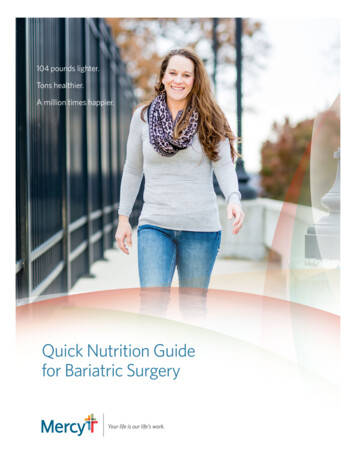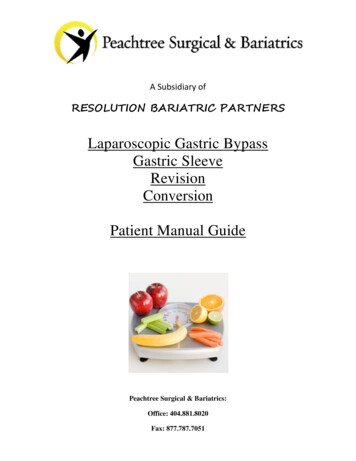
Transcription
A Subsidiary ofRESOLUTION BARIATRIC PARTNERSLaparoscopic Gastric BypassGastric SleeveRevisionConversionPatient Manual GuidePeachtree Surgical & Bariatrics:Office: 404.881.8020Fax: 877.787.7051
Updated 3/2019Our Bariatric Surgeons:Titus D. Duncan, M.D., F.A.C.S.Advanced Laparoscopic Bariatric & General SurgeonAhad Khan, M.D., F.A.C.S.Advanced Laparoscopic Bariatric & General SurgeonMichael Williams, M.D., F.A.C.S.Advanced Laparoscopic Bariatric & General Surgeon2
Table of ContentsMorbid Obesity and Bariatric Surgery4Signs & Symptoms of Complications5Vitamin Deficiency/Recommended Vitamins6What to Expect After Surgery7Helpful Rules for Effective Weight Loss8Preparing for Weight Loss Surgery102 Day Clear Liquid Diet11Morning of Surgery11After Surgery/Discharge Instructions12When to Call Your Physician13Follow-up14Medications to Avoid after Surgery15Medications that are Safe after Surgery16Your Program of Recovery after Surgery17Exercise/Exercise Prescription20Advancing your Diet after Surgery27General Dietary Guidelines for Life31How Do I Get the Recommended Amount of Protein33Food Labels34Guidelines for Food Selection35Types of Protein Supplementation36Important Information About Follow-up383
Morbid Obesity and Bariatric SurgeryMorbid obesity, also referred to as clinically severe obesity, is a chronic disease that afflicts approximately 9million adult Americans. For comparison purposes, obesity affects twice as many patients as Alzheimer’sdisease. If the entire morbidly obese population lived in one state, it would be the 12th largest state in thecountry. The health effects associated with morbid obesity are numerous and can be disabling. Often,individuals with morbid obesity suffer with more than one health effect, creating a situation that can shorten lifespan and negatively impact quality of life. Understand that you are not alone, and we are here to help youovercome this disease and put you on the track of a healthy life.The many benefits of achieving appropriate weight and eating control are obvious. Everyone feels betterphysically and emotionally when his or her weight is under control. In addition, high blood pressure, sleepapnea, reflux, diabetes, cholesterol problems and other health problems have been demonstrated to be improvedonce weight loss is achieved. It is important to understand that weight loss should be gradual, sustained, andaccompanied by careful attention to proper nutrition.Bariatric surgery is major surgery. Patients who undergo any operation incur a certain amount of surgical risk.An obese patient’s risk for complication following major surgery is increased when compared to non-obesepatients undergoing similar surgery. The occurrence of various complications after bariatric surgery isrecognized and anticipated; and although complications can be minimized, they cannot always be avoided.Below is a partial list of the complications patients must consider when thinking about proceeding with surgery.These complications will be listed on an operative consent form and will be reviewed prior to surgery.Possible Complications: Cardiovascular Problems (especially with unidentified preexisting heart disease): heart attack, stroke or death.Respiratory Problems: pneumonia, pulmonary embolus.Wound Problems: infection in wound ( 5%), herniadevelopment (1% for laparoscopic).Stomach/Intestinal Problems: leak from stomach or intestinalsurgical sites requiring additional surgery, intestinal blockage(1-2%), stromal stenosis from scarring (1%), dumpingsyndrome (cramping, bloating, diarrhea after eating).Nutritional Problems: excessive weight loss, vitamin andmineral deficiencies (may need ongoing medications or injections), hair loss, bone weakening,gallstones or kidney stones.Injury to Nearby Organs: spleen-splenectomy ( 1%), significant liver bleeding ( 1%), or potential fortransfusions ( 5%).Death Can Occur: For Laparoscopic Gastric Bypass/Sleeve (0.5-1%)4
Signs and Symptoms of ComplicationsLeak at the Staple line (Gastric Sleeve) or Anastomosis (Connection from your small intestines to yournew pouch- (Gastric Bypass))During your surgery, your surgeon will check to see if there is an air leak. This is done by filling your new pouch/stomach with air and your belly with saline. If there are airbubbles present, the suture line/staple line will be reinforced.Call your surgeon if you experience Increased heart rate Sense of anxiety*** Fever Worsening Shortness of breathThese may be signs of a leak and may require intervention.Pulmonary EmbolismA pulmonary embolism is a clot that has traveled from another part of your body, usually your legs that blocksair from going in and out of your lungs. This is the most common early complication of surgery.This is an emergency!Go straight to your local Emergency Room! Chest paino Under the breastbone or on one sideo Especially sharp or stabbing; also, may be a burning, aching, or dull, heavy sensationo May get worse with deep breathing, coughing, eating, bending, or stooping (person may bendover or hold his or her chest in response to the pain) Cougho Begins suddenly and may have some blood or blood-streaked sputum Rapid breathing Rapid heart rate Shortness of breatho May occur at rest or during activity or it may start suddenlyWhat you can do to prevent a Pulmonary EmbolismWALK, WALK, WALK!!!The day of surgery, the nurses will have you walking in the halls. This will help to decrease the chance of ablood clot in your legs. You will also be given a dose of a blood thinner prior to surgery and after surgery.You will also use a compression device on your legs while lying in bed in the hospital to decrease the risk.At home WALK, WALK, WALK!!!Choose the bathroom furthest from your room. Resume your activities as directed.5
Vitamin DeficiencyAfter your surgery, it is extremely important that you continue to take your vitamins as directed by yourprovider.Calcium is necessary for maintaining bone strength and helps prevent fractures.Vitamin B12 Nourishes the nervous systemIron Carries Oxygen throughout the bodyWithout these vitamins Calcium: risk of fractureVitamin B12: risk for memory loss, numbness, paralysisIron: risk for a stroke, heart attack or anemiaRecommended Vitamins1. Multivitamin or Juice Plus200% (RDA) Recommended DailyAllowance:Juice Plus 1 multivitaminor2 Multivitamins/day (preferably bariatricvitamins)3. Iron – 100% RDA Ferrous Sulfate – 325mg/day(Some brandsmay say 65mg equivalent to 325mg) Ferrous Gluconate – 325mg/day Elemental Iron – 18-27mg/day(Women with menses need 50-100mg/dayof elemental iron)2. Vitamin B-12 (Cobalamin)350mcg or greater every day by mouth or1000mcg twice a month by injection4. Calcium 1500-2000mg/day Vitamin DDivide this into 3 doses per dayChoose a brand that contains calcium citrateand Vitamin D35. B ComplexB-50 dosage or B-100 dosageDehydration It is very important that you drink 64oz of water a day.Dehydration may lead to hospitalization.To prevent this Sip, Sip, Sip all day long!6
Wound InfectionAfter surgery, you will have multiple small incisions on your abdomen and in your belly button.You will have steri-strips on these incisions. Please call your surgeon if you experience:o Redness at incision siteo Increased tenderness or warmth at incision siteo Fever 101.0o Yellow or green discharge at incision siteo Excessive swelling at incision siteo If bleeding saturates the 2nd dressingWe recommend that you clean your incision sites, especially your belly button with hydrogen peroxide orAlcohol pads at least once a day to prevent infection for 5 days post-op. Drainage is normal from your belly button, but if it is yellow or tan please contact your surgeon.What to Expect after SurgeryIt is very important to follow the eating and drinking instructions starting right after the operation to allow thenew stomach structure to heal completely and in the right position.You will notice a difference in the amount and type of food you can eat. You will receive nutritionalcounseling to help show you the do’s and don’ts. Since the amount of food you can eat will be much less, itbecomes very important to eat the right types of food to be sure your body gets enough nutrients.Exercise is important. Most people find that as the weight comes off after surgery, it becomes easier toexercise. Then, as they exercise more the weight comes off even more. It’s like a reverse snowball effect: as asnowball rolls downhill, it goes faster and grows bigger – but instead of a snowball getting bigger, it is yougetting smaller and healthier! We recommend that our patients exercise at least 30 minutes a day, at least 5days a week.It is reasonable to expect to lose about half of your excess body weight after Bariatric surgery. Most patientslose about 80-100 pounds in the first year and stabilize at their new lower weight between 3 and 5 years aftersurgery.Weight-related medical problems may be alleviated or eliminated after weight-loss surgery. Such conditionsinclude diabetes, high blood pressure, sleep apnea, joint pain, back pain, and weight relateddepression. Significant weight loss may also decrease your risk of heart disease and some types of cancer.7
Helpful Rules for Effective Weight LossRule 1: Eat only when you are hungry, and no more than three small meals a day.Your new small stomach can hold only about 1oz (Gastric Bypass) and 3-4oz (Gastric Sleeve) of food. If youtry to eat more than this at one time, you may become nauseated or vomit. If you routinely eat too much, thesmall stomach may stretch. Frequent vomiting will cancel the effect of the operation and can also cause certaincomplications. To avoid this, you need to learn to listen to your body and stick to your plan.Rule 2: Eat slowly and chew thoroughly.Food can pass through your new stomach only if it's been chewed into very small pieces. Always remember totake more time for your meals and chew your food very well. An excellent habit to develop is to put your forkdown while you finish chewing your food.Rule 3: Stop eating as soon as you feel “satisfied”.If you eat until you feel “full,” the food you’ve consumed has come in contact with the walls of your stomach.This will stretch your stomach! Over time, your stomach will stretch until you find that you can eat more food.At that point, you will begin to regain your weight! You have to practice to sense the feeling of “I’msatisfied”. If you stop eating once you feel “satisfied”, the food has not touched the walls of your stomach andyou will not stretch your stomach. This sensation prevents you from stretching your stomach. So, again, take abite of food and put your fork down while you chew. If you rush through your meal, you may eat more thanyou need. This can lead to nausea and vomiting. Take time to enjoy every bite of your meal. Try to recognizethe feeling of “I’m satisfied”-then stop eating at once. It takes practice to recognize this sensation, but it isalways there a bite or two before you feel full. This is extremely important!Rule 4: Do not drink while you are eating.The Gastric Bypass, sleeve and revisions can work only if you eat solid food during your three meals. Youshould not drink anything for 30 minutes before and 30 minutes after a meal. This allows you to keep thefeeling of fullness as long as possible.Rule 5: Eat only good quality, nutritious food.After Bariatric surgery, you should be able to eat only a small amount so the food you eat should be asnutritious as possible. Follow the nutrition guidelines in the previous section and specific instructions from yoursurgeon and/or dietitian. Also, ask your doctor or dietitian before you take any vitamin supplements.Rule 6: Avoid fibrous food.Food that contains many fibers, such as asparagus, can cause the food to become stuck. That's because you can'tchew this food well enough to break it up into small pieces and your saliva can't break it down. Fibrous foodshould be avoided. If you would like to eat asparagus or other fibrous foods once in a while, then be sure tocook them well, cut them into very small pieces first, and then chew thoroughly.Rule 7: Drink enough fluids during the day.Drinking enough fluids is essential for staying hydrated and for flushing waste products out of your body.Individual needs will vary, but you should drink at least six to eight glasses of liquid a day. Remember: Drinkonly non-carbonated/zero calorie liquids such as water, tea, or coffee (without milk, cream, or sugar). Also,keep your food and drinks separate during the day.8
Rule 8: Drink only low-calorie liquids.Drinks, including those containing calories (milkshakes, sodas), simply run through the small stomach. If youdrink liquids high in calories, you will lose little weight, even if you follow all the other dietary guidelines.Rule 9: Exercise at least 30 minutes a day.Since physical exercise consumes energy and burns calories, it is a very important part of any successfulweight-loss program. Obviously, exercise can also help improve your general health. In addition to adopting aroutine exercise program, you can increase your activity level in your everyday life. For example, stand ratherthan sit, walk rather than stand, be outside rather than inside, walk rather than drive, climb the stairs rather thanuse the elevator. If it's too hot outside to walk, go to the mall. It's as easy as finding a parking space away fromthe entrance to the mall and using the stairs, not the escalator! If you don't have time before or after work, taketen minutes out of your lunch break and walk then. Remember that you should always check with your doctorabout the amount and type of exercise that is best for you.We’ve included our workout routine (attached). We know that you may have your own exercise routine inmind, but this exercise prescription that we would like you to do, has been proven to activate the hormones toaccentuate and maintain the hormones that are activated by the surgery and will keep the fat burning processgoing. This is the style of “high intensity exercise” that we suggest to help you keep your metabolism elevatedand activate internal hormones that ultimately burn the fat. When performed correctly, this type of exercise isaerobic, anaerobic, toning and fat burning. It is of greatest help if you learn to start doing these exercises now,prior to surgery so that you will be well educated on the type of exercise we suggest. Read the instructionscarefully. The trick is NO REST between the exercises. Rest for 2 minutes only after you’ve completed the fullset.9
Preparing for Weight Loss SurgeryTwo Weeks before SurgeryStart on a High Protein Diet. You need to purchase a protein shake mixture from any of your local grocerystores or Retail stores such as GNC, Wal-Mart, and Target. The protein shakes must be low issugars and carbohydrate. Drink the protein shake for breakfast and a lean meat and vegetablefor lunch and dinner. This will help shrink the liver prior to surgery. You may drink otherliquid drinks (sugar free) in between the meal. We can provide with our suggestions such asthe one we offer in the office called Unjury or Premier.One Week before SurgeryDo not take Coumadin, Plavix, Aspirin, Ibuprofen or other arthritismedications for one week before surgery, because these medications cancause stomach irritation and/or more bleeding after surgery.Have your physician convert all of your time released or extended released medication to non time released. Ifyou are unsure about which medications to stop, contact your pharmacist.Pre-Operative PreparationPreparation for bariatric surgery includes several steps to optimize a patient’s health in anticipation of anoperation. Stop all carbonated beverages Stop all beverages which contain caffeine Begin a routine exercise program (consult your physician first) Begin cutting food into small pieces and practice chewing very well Stop any over the counter Herbal Supplements Join a monthly support groupBegin the practice of not drinking with your meals. Stop drinking 30 minutes before you eat and do not drink againuntil 30 minutes after you eat. This will be a requirement following your surgical procedure and needs to become alifetime habit.You will be scheduled for an EGD (endoscopy) prior to surgery. REMEMBER, nothing to eat or drink after midnightprior to this procedure.10
2 Day Clear Liquid Diet Prior to Bariatric SurgeryYou will need to consume clear liquids only for the 2 (Two) days prior to surgery.This would include: Apple or other clear juice, Sugar free(juice without pulp) Clear Broth (Chicken, vegetable or beef) Jell-O (any color is fine) Sugar free Popsicles Water or flavored water products NO SOLID FOODMorning of SurgeryYou will receive a call from the office, or the surgery center the night prior toyour EGD and/or surgical procedure to be told when to report to the center. Youwill be asked to report between approximate 2 hours prior to the plannedprocedure. For patients going to a Hospital, you will be given specificinstructions when you go for your pre-op evaluation. If you are having yoursurgery at the Surgery Center of Atlanta (SCOA) you will go to the facility onyour pre-op visit and sign consents and be oriented to the facility. Please remember to bring a picture ID and/ordriver's license with you to the hospital. We will need to verify your identification prior to placing an arm bandon your wrist.You will be asked to remove all of your clothing and put on a patient gown and a pair of booties. The nursewill start an IV in preparation for surgery.You will receive medications that have been ordered by your physician or anesthesia at this time in preparationfor surgery.If you consumed any medication the morning prior to reporting to the hospital, let the nurse know.You will be taken to the Operating Room and placed in the Holding Area. Upon arrival to the holding area, youwill meet the individuals who will be taking care of you during surgery. The anesthesiologists will speak to youas well, and you will be given some medication that will make you very drowsy prior to actually being taken tothe Operating Room suite.Your family members will be asked to wait in the Surgical Waiting Room. Please limit your family members tothree (3) adults. Children under the age of 12 should not accompany patients to the surgery center.11
After SurgeryYou will be taken to the Recovery Room following surgery where they will monitor your respiratory status andother vital signs to be sure you are stable before sending you to the nursing unit. If there should be anyconcerns regarding your vital signs or respiratory status, you may be sent to the Surgical Intensive Care Unit tobe monitored post operatively. This does take place on occasion and you should be aware of the possibility.You may experience pressure in your abdomen during your stay in the recovery room. This is a normaloccurrence; however, you should notify your nurse of any discomfort that you may be experiencing.When the Anesthesiologist feels you are stable and doing well, you will be evaluated for discharge.Discharge InstructionsBATHING:You may shower 48 hours after surgery. No tubs baths, swimming or hot tub use for 4 weeks following surgery.Patients performed at the surgery center will return to the office the following day for wound check andmetabolic hydration. This visit may take up to 2 hours. It is meant to jump start your metabolism with IVhydration mixtures.DRESSINGS:Keep the dressing dry for 48 hours after surgery. After 48 hours you may remove the top dressing and leave thesteri-strips (thin tan/white pieces of tape). These may get wet and will eventually fall off voluntarily. The onesremaining will be removed in 2 weeks on the first post-op visit. The umbilical area may not have steri-strips.The umbilical area may drain a clear light brown or pale red color fluid. This is ok as long as the drainage is notpale yellow or tan in color. Some of you will have clear glue like substance over your incisions. This will stayon until it peels off by itself.Your incisions should be cleaned once a day with Hydrogen Peroxide and a cotton ball or gauze. Clean the bellybutton (umbilicus) area with Hydrogen Peroxide or alcohol as long as it is draining. Do not put any Q-Tips intoyour umbilicus!ACTIVITY:You may resume usual self-care. You may drive when you feel you are able and you are not taking prescriptionpain medication. No lifting, pushing, pulling or tugging over 25 lbs for 4 weeks. Walking every day and usingincentive spirometry at least 4 times a day (for 2 weeks) is very important.MEDICATIONS:Gas-X as needed up to 7 times per day.Liquid Imodium if needed or as directed for diarrhea.Tylenol Rapid Blast for mild pain. Follow package directions12
NO ASPIRIN, NO NONSTEROIDAL ANTI-INFLAMMATORY DRUGS,NO TIME RELEASED DRUGS(Arthritis medication, Aleve, Motrin, Advil)REMEMBER TO STOP TAKING YOUR MEDICATION FOR DIABETES THE DAY OF SURGERY.HOWEVER, CONTINUE TO CHECK YOUR SUGAR AT HOME. IF YOUR SUGAR INCREASESABOVE 150, CALL YOUR PRIMARY CARE PROVIDER SO HE/SHE CAN MANAGE YOUR SUGAR.REMEMBER TO CONTINUE TO TAKE ALL OF YOUR OTHER MEDICATIONS AND LET YOURPCP OR CARDIOLOGIST DECREASE THEM AS NEEDED.WHEN TO CALL YOUR PHYSICIAN’S OFFICE SHORTNESS OF BREATH or increase in breathing RAPID OR INCREAE IN HEART RATE BLEEDING: From the incision(s), in vomit or stool (would be black or maroon in color). NAUSEA OR VOMITING that is not relieved by medications or that prevent fluid intake for a day. PAIN that is not relieved by medication prescribed by physician. CALF OR LEG PAIN and/or swelling.SIGNS OF INFECTION: temperature of 101o or above redness and swelling at incision site(s) Pus-like or foul-smelling drainage Separating or opening of healed incision13
FOLLOW-UP:Contact the office if you have any questions:Peachtree Surgical and Bariatrics:Surgery Center of AtlantaOffice Number: 404.881.8020Office Number: 404.233.38334200 Northside Parkway NE Building 8Atlanta, GA 30327Resolution BariatricsOffice Number: 404.881.80204200 Northside ParkwaySuite 2Atlanta, GA 30327Calls will be returned the same day.Make your first post-op appointment with OUR OFFICE for 2 WEEKS after discharge from hospital. Pleasecall if you feel you need to be seen earlier or you have been sent home with drains.Make appointments with your primary care physicians or other specialist within the first week after discharge tomonitor heart, BP and diabetes medications.14
Medications to Avoid After Bariatric SurgeryA.S.A. EnsealsCataflamIndocinAdvilClinorilLodine MagnaprinAlka SeltzerCoricidinMaprin/Maprin 1-BAnacinCortisoneMeasurin dinMeclomenDayproMidol Caplet/200DipyridamoleMobigesic MotrinDislcidMotrinDoan’s lobidNaprosynAscriptin A/D CapletsEasprinNaprosyn Norwich TabletsAscriptin Extra Strength sicEmperinOrudis P-A-C AnalgesicExcedrin – any typePamprinFeldenePepto-Bismol –any typeFiorinalPersantineBufferin–Regular & ExtraStrength BuffexHalfrinTolectinBuffinol Cama Arthritis StrengthIbuprofenVanquishAnaproxAnaprox DSAncid AnsaidAsperbufAspergum Aspirin – all Brandsincluding Children’sAspirinBC Powder/Cold PowderNuprin Caplets/Tabs15
Medications that are Considered Safe after aminicsTylenol cold productsTylenol Extra oriesFleets enemaMilk of MagnesiaPeri-colaceClaritin16
Your Program of Recovery after SurgeryTROUBLESHOOTINGWhat to Do If Food Gets “Stuck”When food is not passing through the stomach you may experience any or all of the following symptoms: Excessive Salivation (Frothing) Heartburn Nausea Cramping Vomiting / Dry Heaves Pain ThirstIn this case, the following steps can be taken to alleviate the discomfort as quickly as possible: Relax! Stress will only increase the discomfort. Lie down if you can. Don’t eat anything. Drink sips of water. Warm beverages seem to help relax the stomach best. Stay on liquids for several hours.Remember if you cannot take in liquids for 24 hours you should contact us for further advice.Did I Chew My Food Well? Did I Take Too Big of a Bite?If you do not chew your food well enough, the bites you swallow will be too large to pass easily from thestomach pouch. The un-chewed bites will remain in the stomach and are more likely to cause discomfort. Yourfood should be cut the same size as your “pinky” nail to be small enough.Nausea and VomitingIt is very common for postoperative patients to feel nauseated during the first few months. If this nausea causesfrequent vomiting, this necessitates a phone call or visit to the office for follow-up.When you feel satisfied, stop eating and put the food away. Don’t pick at it if you are still at the table. A mealshould take no longer than 15 – 20 minutes to finish. If it is taking longer, you are probably waiting too longbetween bites, or getting full and waiting for it to pass through to give you more room. Remember, the goal is tofeel satisfied . NOT FULL; it may take a little time and listening to your body to learn this feeling ofsatisfaction.One of the causes of nausea and vomiting is noncompliance with nutritional guidelines; therefore, following theprovided guidelines is very important.17
Any problems with nausea or vomiting should prompt the following questions and necessary changes to avoidfurther pain and discomfort: How long am I taking to eat and/or drink?Did I drink fluids with my meal or too soon before/after the meal?Am I eating more than I should?Am I chewing solid foods until they resemble a pureed consistency?Did I lie down too soon after my meal?Did I eat hard-to-digest foods such as tough meat or fresh bread?Did I eat foods from the next stage of the menu plan before being cleared by the physician to do so?If vomiting persists throughout the day, do not eat solid foods. Sip on clear liquids (stage 1). If vomiting occursfor more than 24 hours, contact the surgeon immediately.FrothingAs the new stomach heals, mucous sometimes is excreted to help break down food. With some patients, thismucous will back up in the esophagus and causes frothy clear vomiting. This is short lived and usually resolvesby the 3rd month. Frothing is not a complication, so try drinking hot water ½ hour prior to your meal toemulsify the mucous. Your meal should then be better tolerated.Gas PainsGas pains are common in the first few weeks after surgery. Sometimes these painscan be severe and more uncomfortable than the “surgical” pain. To help relieve thesepains, try to increase your activity level to include some walking. You can also tryanti-gas over-the-counter preparations such as Simethicone, Mylanta, Maalox andGaviscon.Gas pains or spasms may occur months or even years after your Bariatric operation.The cause for random episodes of gas or spasms is often unknown, and thisdiscomfort will usually relieve itself in a short time. If the discomfort from gas orspasms persists, contact your surgeon for evaluation and possible treatment with medication to relax theintestine.Hair LossIf you notice hair loss/thinning, especially around the third month after surgery, you should consult with ourdietitian to help increase your protein intake. Hair loss is often attributable to protein deficiencies, and byincreasing your protein intake, you may reduce hair loss. There are no “guarantees,” however. Hair re-growthfrequently occurs after several months. We recommend 70-80Gm protein each day.Bowel HabitsIt is common to have some temporary bowel changes following surgery. These changes range fromconstipation to diarrhea. If you do not move your bowels by the first or second day at home, you may try a mildlaxative such as Milk of Magnesia. Follow the bottle instructions.18
Maroon or blood-tinged stools should be reported to your surgeon, as they may indicate the need for additionalmedication to reduce the chance of ulcers.ConstipationAfter surgery, constipation may occur. Remember that food intake now is very small compared to that beforesurgery; therefore, bowel movements will be decreased. Many people report having a bowel movement everytwo to three days. If stools are hard, be sure to drink an adequate amount of fluid (48 to 64 ounces per day)between meals. Also, when appropriate, include more fiber-containing foods in the meal plan such as certainfruits, and fiber products. You may also try Smooth Move, Apricot or Prune juice (unsweetened), Milk ofMagnesia or MiraLAX.DiarrheaImmediately following surgery, there may be some diarrhea. This should be temporary. If diarrhea occursmore than 3 times in a day, you may take Imodium or over the counter equivalent. If diarrhea persists andadequate hydration is not possible, contact the office. You may have bloody stools (black tarry) the first 1-2bowel movements. If this persists, please call the office.SleepingYou may sleep in whatever position is comfortable when you gethome. Manypeople find that sleeping on their stomach may not be comfortable formany weeks dueto abdominal discomfort. If you are having difficulty sleeping, this isnormal and mostlikely due to the busy 24-hour schedule of the hospital environment.Some people findthat taking their pain medication before sleep will help them feel more comfortable and get to sleep. You mayalso try a mild crushed sleeping aid such as “Tylenol PM” to help you rest if the problem persists.HeadachesSome of you who were without anti-depression medication for several days may have migraine type headachesas a withdrawal effect. Please resume these medications ASAP. (No extended or time released medications.)Returning to WorkYou should plan on taking 7-14 days off work. We recommend to those who must return to work before 2weeks, begin with a less than full time schedule and wo
4 Morbid Obesity and Bariatric Surgery Morbid obesity, also referred to as clinically severe obesity, is a chronic disease that afflicts approximately 9
